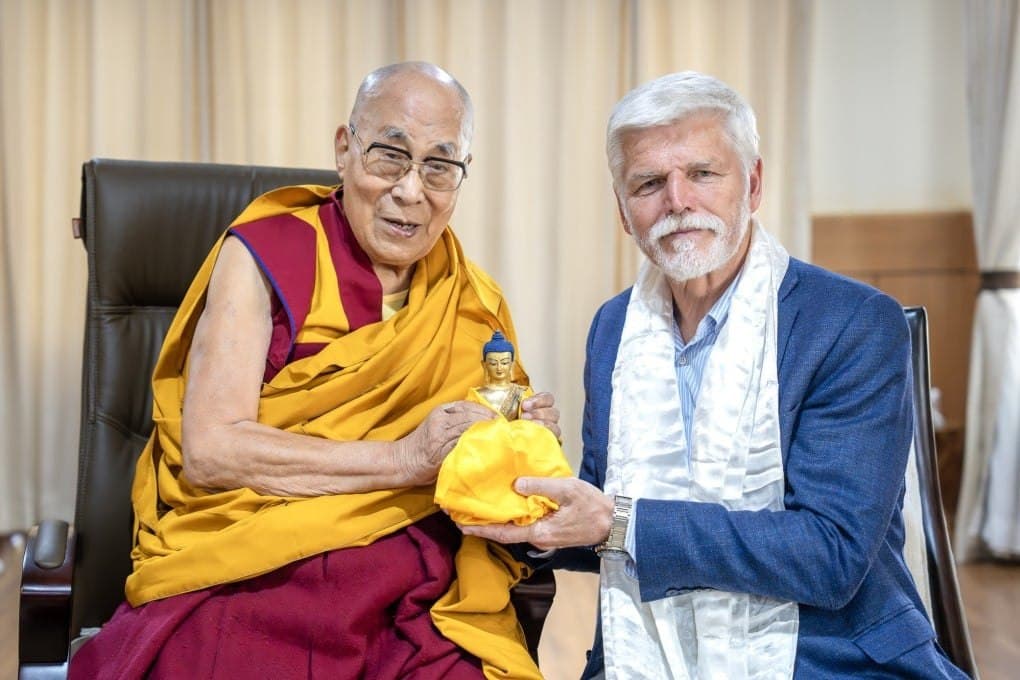China Cuts Ties with Czech President Petr Pavel Over Dalai Lama Meeting, Escalating Diplomatic Tensions
In a significant diplomatic fallout, China has officially severed all communications with Czech President Petr Pavel following his meeting with the Dalai Lama last month. This decision, characterized by Beijing as a breach of its sovereignty, underscores the sensitive nature of international relations regarding Tibet and the status of the Dalai Lama, whom China views as a separatist figure.
Background & Context
The Dalai Lama, the exiled spiritual leader of Tibetan Buddhism, has long been a contentious figure in Sino-Czech relations. China, which considers Tibet an integral part of its territory, perceives any engagement with the Dalai Lama by foreign leaders as a challenge to its authority. This latest diplomatic rift stems from President Pavel"s meeting with the Dalai Lama during a trip to India, which was interpreted by Beijing as a direct violation of its internal affairs.
The Czech Republic has a complex history with China, marked by a series of diplomatic tensions. In recent years, the relationship has fluctuated between attempts at engagement and episodes of conflict, particularly concerning human rights issues and China’s influence in Central Europe. Pavel"s predecessor, Miloš Zeman, had cultivated close ties with Beijing, but Pavel"s presidency has signaled a shift toward a more critical stance on human rights and democratic values.
Key Developments
Following the meeting, the Chinese Foreign Ministry issued a stern statement condemning Pavel"s actions, declaring that the Czech president"s engagement with the Dalai Lama was "a serious violation of China"s sovereignty." The ministry emphasized that such actions "interfere in China"s internal affairs" and warned of potential repercussions for bilateral relations. As a result, all diplomatic channels between the two nations have been suspended, signaling a new low in their interactions.
Pavel has defended his meeting with the Dalai Lama, asserting that it was a personal and spiritual engagement rather than a political statement. He emphasized the importance of dialogue and the need to uphold human rights, a sentiment that resonates with many in the international community. However, his stance has drawn ire from Beijing, which has a history of responding aggressively to perceived affronts.
Broader Impact
This diplomatic rupture could have wider implications for the Czech Republic as it navigates its position within the European Union and its relations with other global powers. Experts suggest that the Czech Republic"s alignment with Western values regarding human rights may further isolate it from China, a major economic partner. As previously reported, the EU has been increasingly vocal about human rights abuses in China, which may embolden other nations to take similar stances.
In the context of global geopolitics, the situation mirrors previous tensions involving China and other nations that have engaged with the Dalai Lama. For instance, relations between China and countries like the United States and India have similarly soured over interactions with the Tibetan leader. The current situation in the Czech Republic could serve as a bellwether for how nations balance their economic interests with ethical considerations in foreign policy.
What"s Next
Looking ahead, the Czech Republic may need to reassess its diplomatic strategies in light of this latest development. Analysts predict that President Pavel will continue to advocate for human rights, potentially leading to further strain on relations with Beijing. The Czech government may also seek to strengthen ties with other European nations and allies that share its values, particularly in the face of growing authoritarianism globally.
As tensions escalate, the international community will be closely monitoring the situation for potential ramifications. The Czech Republic"s next steps could influence not only its bilateral relations with China but also set a precedent for how other nations engage with Beijing over sensitive issues. Similar situations in different regions, such as recent developments in Iran or conflicts in Mali, highlight the intricate balance of diplomacy in a rapidly changing world.


![[Video] Heavy clashes and gunfire reported in Baghdad, Iraq](/_next/image?url=%2Fapi%2Fimage%2Fthumbnails%2Fthumbnail-1768342239932-848qsh-thumbnail.jpg&w=3840&q=75)




![[Video] Gunfire between Iraqi security forces and Sadr militias in Baghdad](/_next/image?url=%2Fapi%2Fimage%2Fthumbnails%2Fthumbnail-1768343508874-4redb-thumbnail.jpg&w=3840&q=75)
